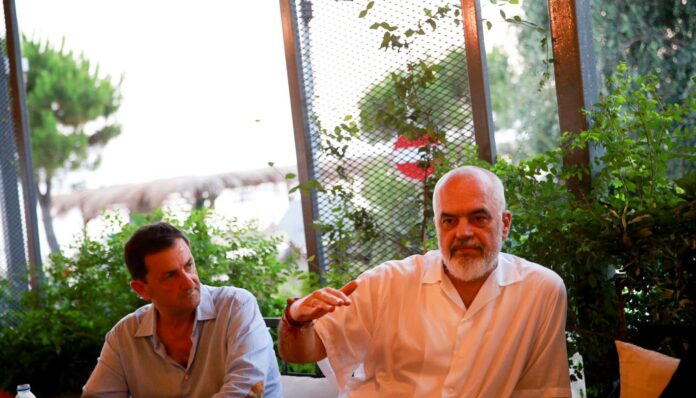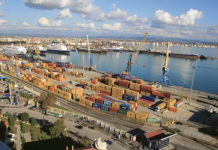Nevila Gjata
Two days before the Himara Municipal Elections, Prime Minister Edi Rama held several meetings on the town’s main street with Vangjel Tavo alongside. Rama expressed his enthusiasm, noting that the campaign had changed compared to a year ago with Vangjel Tavo’s approach.
“This one doesn’t run a traditional campaign; he connects with people door-to-door and doorstep-to-doorstep. After Gramoz Ruçi, he has the longest phone number list. Send him a message, and he calls you directly…’ said Rama.
Sunday’s results in Himara confirmed Rama’s forecast: Vangjel Tavo emerged victorious. The socialist candidate won the Himara municipal election with 58.62% of the vote.
Tavo received 5,022 votes, while Petraq Gjikuria, the DP candidate (nominated by PBDNJ and Omonia), who received 41.38% or 3,545 votes.
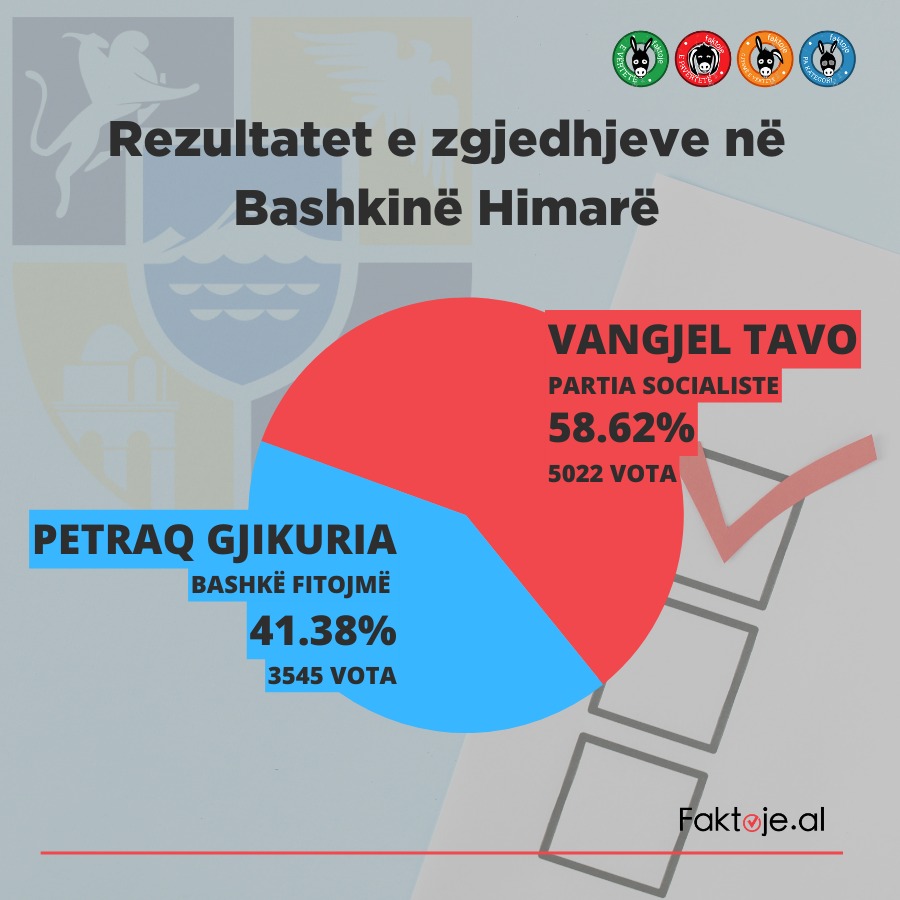
A 1,477-vote difference from the previous year, when Fredi Beleri narrowly won by 19 votes against socialist candidate Gjergji Goro. Vangjel Tavo will first need to receive his mandate from the Central Election Commission (CEC) and then take the oath at the first meeting of the Himara Municipal Council to officially assume his role.
Campaign
In the Himara race, there were two ‘imported’ candidates: Vangjel Tavo, a long-time representative of Dropulli and former Prefect of Vlora, and Petraq Gjikuria, a Greek-speaking candidate from the USA.
Vangjel Tavo ran a relatively subdued campaign, avoiding elaborate events and focusing on sharing concise but impactful messages through his Facebook page. His campaign emphasized resolving the property certificate issues, which are a significant concern for Himara residents.
In contrast, Petraq Gjikuria campaigned by leveraging the name of Fredi Beleri, who is currently imprisoned for vote-buying. Gjikuria appeared alongside Beleri upon his return to Albania after taking the oath as an MEP in Strasbourg. As the campaign closed, Gjikuria continued to seek votes by invoking Beleri’s name and promising to implement his program if elected.
‘What happened to my friend Fredi Beleri is a disgrace. Fredi will be released in two months, and Himara will be liberated on August 4,’ stated Petraq Gjikuria at the final rally.
Regarding property issues, Gjikuria adopted a denunciation approach, supported by DP officials, claiming that the government would not address property problems and might even ‘expropriate’ them.
In contrast, Vangjel Tavo, aligned with the SP in the government, promised to resolve these issues.
‘The critical property issue for all residents should have been addressed 30 years ago. What was left unresolved since 1991, we have managed to tackle in just a few months, issuing over a thousand property certificates. This issue will soon be fully resolved. After three months of work, the solution to the property problem is almost complete. The people of Himara have the right, by both divine and legal standards, to enjoy their properties. Anyone trying to seize their land will never have access to the Himara Municipality, nor will they ever receive the support, endorsement, or signature of Vangjel Tavo. The property issue will be resolved definitively…’ Tavo promised, while Rama has set October as the deadline to finalize this matter.
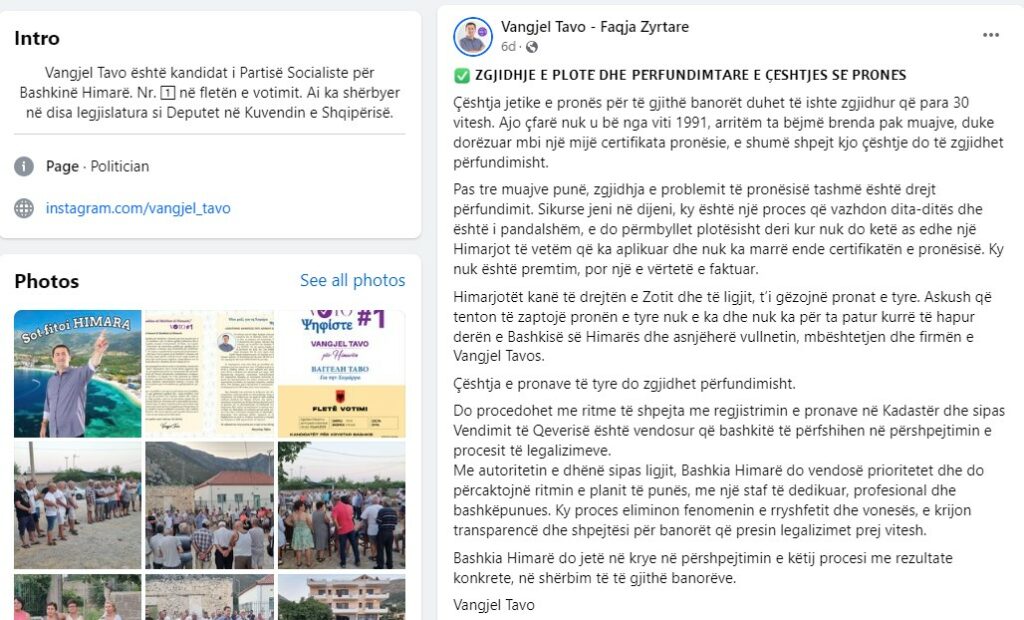
None of the candidates provided a clear program addressing the various issues within the Himara Municipality, which includes the administrative units of Himara, Lukovë, and Vranisht.
Vangjel Tavo shared a brochure on Facebook as part of his program, but it lacked detailed information. Petraq Gjikuria also did not present a clearly defined program.
Election Day Issues
On election day, the primary issue reported was the inability to vote with expired identification documents. There are 6,157 Albanian citizens living in Himara who have not renewed their identity cards, as confirmed by Chief Election Commissioner Ilirjan Celibashi. Notably, Celibashi pointed out that this number of voters was the same as in the previous 2023 elections, indicating that most of them currently live abroad. However, Celibashi was unable to distinguish how many were abroad and how many actually resided in Himara.
Denar Biba (former head of the CEC) commented on Facebook that ‘according to the TIMS system, only a few dozen of them had shown up at the polling stations on Sunday.’
Omonia did not provide an exact number of how many individuals went to the polling stations and were turned away due to expired identity cards. According to Omonia, citizens who were identified as potential opposition voters were told that their identity cards would be renewed within 15 days, after the election date, which was yesterday.
‘We estimate that out of 23,074 registered voters, 6,157 were effectively deprived of their voting rights due to the decisions and responsibilities of the ‘Rama’ government,’ Omonia reported.
Ilirjan Celibashi clarified on Sunday that this issue was the responsibility of the government. However, he indirectly criticized the opposition by mentioning that the CEC had not received any official requests from parties to negotiate with the government to issue a decree allowing voting with expired identity cards. In the meantime, the Democratic Party, the Party for Freedom, PBDNJ, and Omonia all cited this issue as the main reason for their loss in the Himara elections.
Votes
The voter turnout this year was higher than in 2023, where 7,821 voters cast their ballots. This year, 8,692 voters participated, marking an increase of 871 voters.
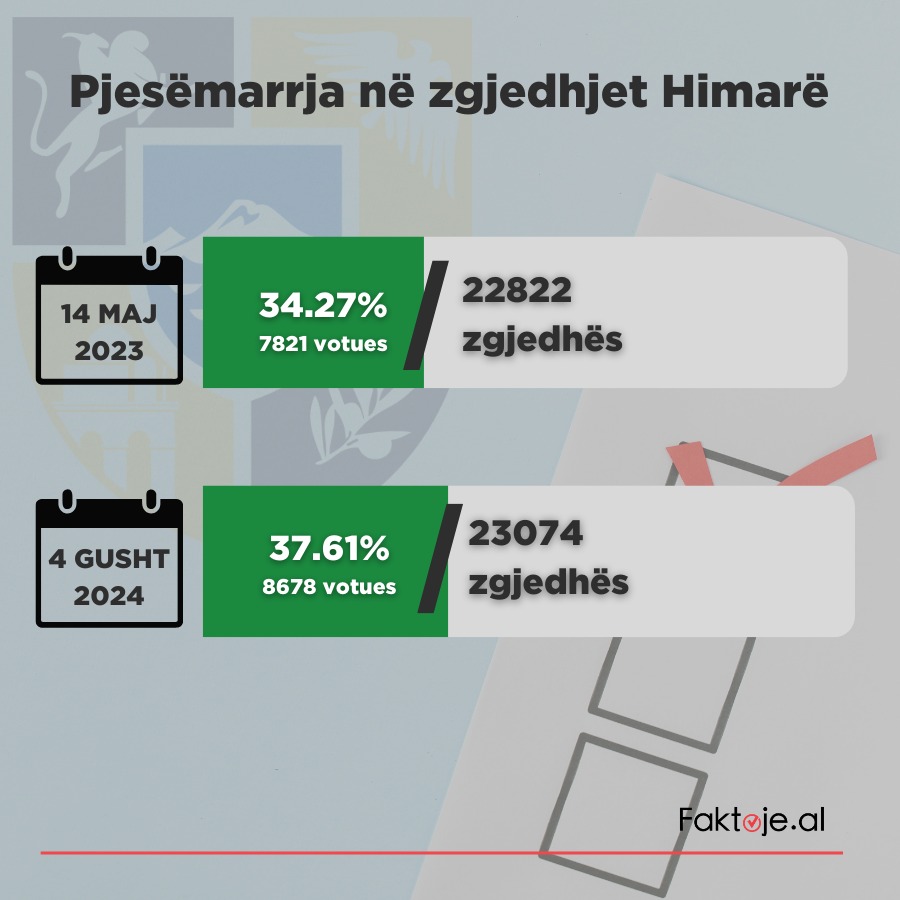
According to the results published on the official CEC website after the polls closed and the counting was completed, the Socialist Party has shown a notable increase in votes compared to the previous year, in proportion to the rise in voter turnout across all three administrative units.
In Himara, Vangjel Tavo secured 2,132 votes, an increase from the 1,576 votes received by Jorgo Goro. This increase in votes was mirrored by a rise in voter participation, which grew by 572 voters compared to previous elections. Meanwhile, Petraq Gjikuria saw only a marginal increase in votes in Himara, gaining 16 more votes compared to 2023.
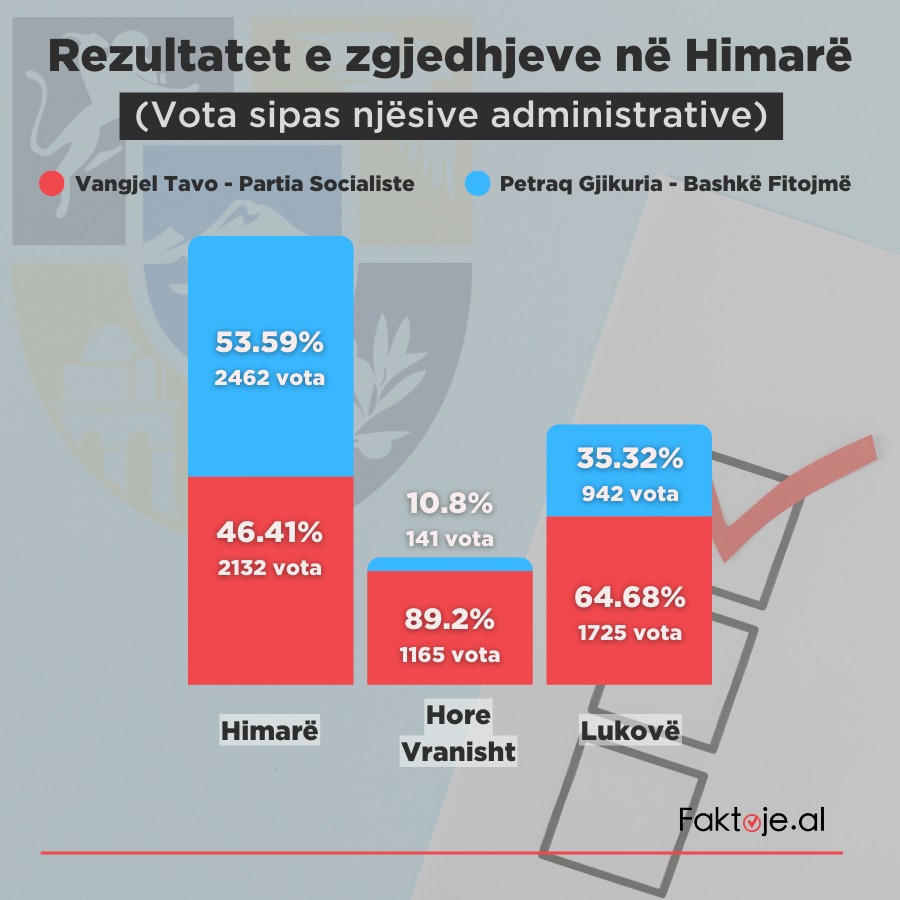
Despite the increase in votes, the Socialist Party continues to lose in this unit. Vangjel Tavo received 2,132 votes, while Petraq Gjikuria obtained 2,462 votes.
In Lukovë, the Socialist Party’s performance improved. Vangjel Tavo secured 1,725 votes, compared to Petraq Gjikuria’s 942 votes. Voter turnout in Lukovë was higher than in 2023, with an increase of about 200 votes. The difference in votes in this area compared to the previous year was only 70.
Hore Vranisht, traditionally a left-leaning area, also saw a higher voter turnout compared to 2023, with an increase of around 200 voters. Vangjel Tavo received 1,165 votes this year, up from 972 votes for Gjergji Goro in the previous election. The Democratic Party received 50 fewer votes compared to 2023 in this area. Petraq Gjikuria managed to secure only 141 votes in this unit.
Differences From the 2023 Elections
First, the voter turnout in these elections was higher, with 871 more voters compared to the 2023 elections. Unlike previous elections, this campaign was notably calm and free from nationalist rhetoric. There was no presence of Greek politicians during these elections. Additionally, there was an increase in the number of voters on the electoral rolls for the Municipality of Himara compared to the previous year.
Vice Chair of the Central Election Commission, Lealba Pelinku, reported a day before the elections that there had been an addition of 311 new voters in Himara, with 93 of these added in just five days. Pelinku called for an investigation into this issue.
This election campaign was also the shortest ever.
Due to the tight 30-day period following the election decree, the CEC determined that the campaign duration should be limited to just 9 days. This timeframe was influenced by the deadlines for forming Electoral Zones, registering electoral subjects, establishing initiating committees, coalitions, and candidates.
Given the date of the Decree, the deadline for finalizing the voter list was set for no later than July 10, 2024, which also made it impossible to issue new voter cards for those wishing to vote this year.
New Elections, Old Problems
The Albanian Helsinki Committee monitored the elections in Himara both before and the day after.
Erida Skëndaj, Executive Director of the Albanian Helsinki Committee, shared with Faktoje.al that, from the pre-election observations and interactions with voters, it appeared that voters generally felt free to exercise their right to vote.
‘Nevertheless, there were still reports of vote-buying through material goods offered by both electoral parties, misuse of public assets such as the allocation of property titles, and pressure exerted on local public administration,’ she pointed out.
Monitoring of 44% of the voting centers in Himara Municipality, including 14 centers in the villages of Qeparo, Borsh, Piqeras, Lukovë, Himara ‘Fshat,’ and four centers within the city of Himara, revealed that the voting process took place in a generally calm environment. The main issue observed was the tension related to voters under 75 years of age who had expired identity documents and were thus unable to vote.
Key problems affecting the voting process included inadequate training for commissioners, particularly those in rural voting centres, which led to several irregularities. These included partial failure to follow procedures for assisting voters who needed help, allowing voters in around four cases to enter the voting booth with their mobile phones, occasional family voting, and difficulties in closing the voting centers according to procedures, causing some delays. The counting process was handled quickly, and there were fewer disputes over the validity of the ballots compared to previous elections,’ Skëndaj reported.

